Dog Sitter Asks If It’s Okay To Charge Her Client For The Rug And Couch Her Dog Destroyed
Taking care of a pet is much more than feeding it and providing a warm, dry place to sleep. You have your friends, family, and work, but your dog has only you.
You are responsible for everything that happens around and to it, and that’s quite a responsibility. In some ways, it is more difficult than raising a child because kids become more independent over time.
Pets, on the other hand, do not. They rely on you for everything.
So, what do you do if you want to go on vacation? Or if you have to go on a business trip?
If you are fortunate enough to live near friends and family willing to watch your pets, you don’t have a problem. However, many pet owners do not have anyone to entrust their pets to, and they resort to services such as kennels and pet hotels.
Some people prefer hiring pet sitters, which can be more costly than a hotel.
Finding a good pet sitter can be quite challenging. However, finding a good pet-sitting client is no easy task either. We have one of those stories today.
It is about a pet sitter who was misled by the client. She was so desperate for OP to take in her dog that she lied about its habits, probably fearing that the pet sitter would refuse to watch an untrained dog.
Read the full story below:
OP asks:

They are pet sitting for a new client. OP asked if the dog had any issues with chewing things before taking him in. The answer was - never.

The toys that came with the dog were all pretty chewed up.

Understanding Responsibility in Pet Care
Dr. Alex Martinez, an animal behaviorist at the University of Minnesota, emphasizes the importance of understanding the responsibilities associated with pet ownership.
When pets cause damage, it raises questions about accountability and fairness in the caregiver-client relationship.
Research shows that clear agreements regarding pet care responsibilities can significantly reduce conflicts between pet sitters and owners.
Responsibility and Pet Ownership
Dr. Alan Roberts, a veterinarian and animal behaviorist at the University of Minnesota, emphasizes the importance of responsibility in pet ownership.
His research shows that pet owners must understand the implications of their decisions, especially regarding financial responsibilities for damages caused by pets.
This responsibility can create significant stress for both pet sitters and owners, particularly when expectations are misaligned.
The client also had some unusual demands about sleeping arrangements:
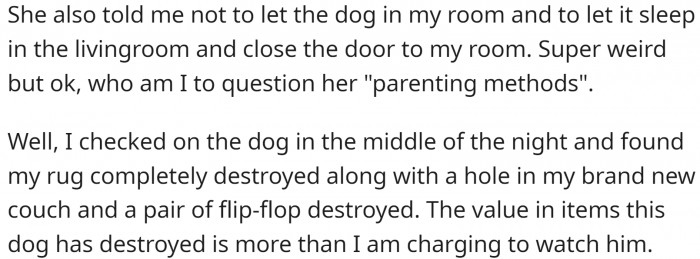
When OP got up in the middle of the night to check on the dog, she found her couch, rug, and shoes damaged. The damage is substantial, and now she asks if it would be okay to charge the client for that.

Redditors agree: the client was dishonest. She knew about the chewing issue, so she should pay for the damages.
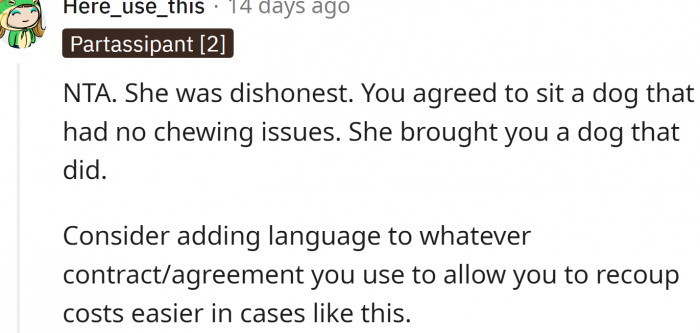
In the Journal of Applied Animal Welfare Science, studies suggest that having open discussions about expectations can help pet sitters and owners avoid misunderstandings.
By articulating responsibilities upfront, both parties can foster a more harmonious working relationship.
This approach can lead to increased satisfaction for both pet sitters and owners alike.
When pets cause damage, feelings of frustration and guilt can arise for both the owner and the caretaker.
Studies in animal ethics suggest that clear agreements and open communication can mitigate these feelings, ensuring all parties have a mutual understanding of responsibilities.
Understanding the emotional bond between owners and pets is crucial in addressing these issues.
OP should take many photos of the damage the dog has caused. Reimbursement is in order.
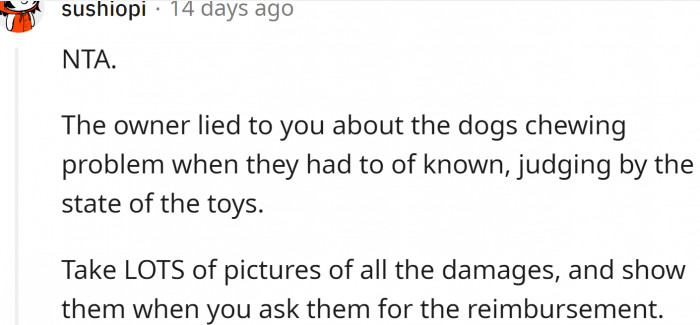
The client's instructions are the only reason this mess happened.

Redditors also noted that a $100 reimbursement is not really enough to cover the damages. OP probably believes it is partly her fault, so the amount is lower.
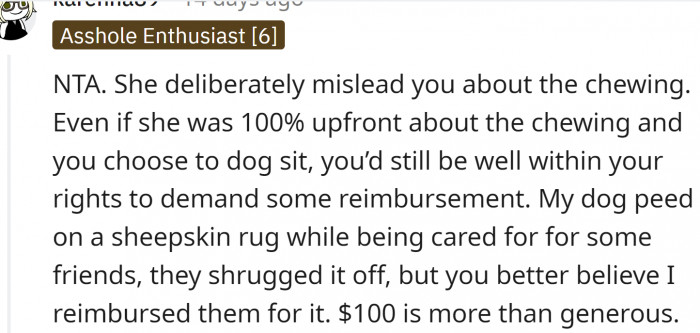
The Importance of Communication in Pet Care Agreements
Effective communication is crucial in establishing pet care agreements that work for both parties.
Research shows that discussing potential issues, such as damage, can help mitigate future conflicts.
Using clear language helps set expectations and reduces the likelihood of misunderstandings.
OP should also reconsider sleeping arrangements, maybe even crating the dog.
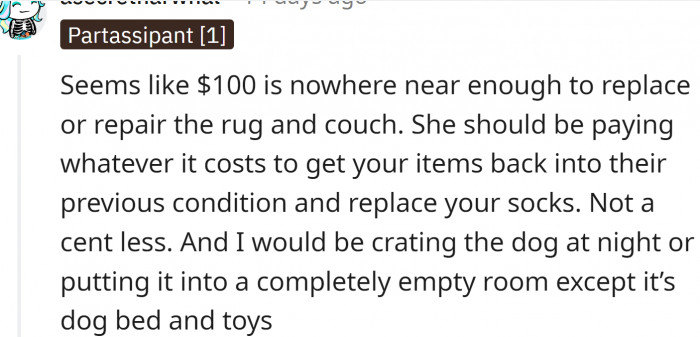
Pet sitting is very popular, as many pet owners believe that this is the ideal environment for their animals. They think that allowing their pet to wander freely and be in a familiar setting would help lessen any stress, worry, or anxiety the animal could experience while they are not with them.
The pet owner will need to decide how to handle this particular issue. But no matter what you decide, you cannot lie to the people who are watching your pet.
Psychological Analysis
This situation illustrates the challenges pet owners face in balancing emotional attachments with practical responsibilities. Open communication about expectations is crucial for maintaining positive relationships in pet care.
Analysis generated by AI
Analysis & Alternative Approaches
Recognizing the responsibilities associated with pet ownership can help foster healthier relationships between pet owners and sitters.
Dr. Roberts' research highlights the importance of clear communication and mutual understanding in navigating the complexities of pet care.
Setting boundaries around care responsibilities is also essential.
Behavioral psychologists recommend that both pet owners and sitters establish clear guidelines regarding acceptable behavior and responsibilities.
By doing so, they can create a framework that protects the interests of both parties.
Addressing Emotional Responses to Pet Damage
Emotional responses to damage caused by pets can vary significantly, often reflecting deeper feelings of frustration or disappointment.
Dr. Rachel Green, a clinical psychologist, notes that recognizing these emotional triggers is key to addressing conflicts constructively.
Validating each other's feelings can help create a supportive environment for problem-solving.
Practicing empathy can also improve communication between pet sitters and owners.
Research indicates that when both parties strive to understand each other's perspectives, they can reduce tensions and foster a more collaborative relationship.
This empathetic approach can enhance satisfaction for both pet sitters and owners.
The Role of Compromise in Pet Care Situations
Compromise is essential in resolving conflicts related to pet care responsibilities.
Research from the Journal of Conflict Resolution highlights that parties who are willing to find common ground report higher satisfaction in their agreements.
By being open to negotiation, both pet sitters and owners can create a better working relationship.
Ultimately, navigating pet care responsibilities requires patience and understanding from both parties.
By employing effective communication strategies and practicing empathy, they can foster a positive relationship that benefits everyone involved.
This collaborative approach can lead to more fulfilling experiences for both pet sitters and owners.
Analysis & Alternative Approaches
In conclusion, navigating pet care responsibilities can be challenging but also presents opportunities for growth and understanding.
Research underscores the importance of communication, empathy, and compromise in these situations.
By adopting these strategies, pet sitters and owners can foster healthier relationships built on mutual respect and accountability.



